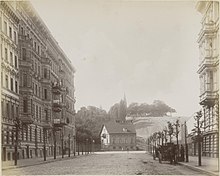Knowledge of Kreuzberg

The so-called Kreuzbergerkenntnis (also: Kreuzberg judgment) is a judgment of the Prussian Higher Administrative Court , based in Berlin , on June 14, 1882, with which the court restricted the police force in order to guarantee the separation of powers and initiated the decommissioning of the public administration .
The matter was that the Berlin Police Headquarters had issued an ordinance that forbade the owners of the land around Berlin's Kreuzberg from erecting buildings above a certain height. The purpose of this ban was to keep the view of the National Monument for the Wars of Liberation, which was built in 1821, clear. The owner of a nearby property had been denied a building permit , which he had sued.
The Higher Administrative Court declared the police ordinance to be ineffective, arguing that the building police were only responsible for warding off dangers , but not for protecting aesthetic interests.
The ruling was groundbreaking in that it made it clear that urban planning is not one of the tasks of the police. In terms of political history, it was a sign of the end of the absolutist police state , in the understanding of which "police" meant as much as "good order", including the associated welfare tasks ( welfare maintenance ). The police's field of action was thus limited to the task of countering illegal acts or conditions; the (active) shaping of social life was denied it. With the judgment, the administrative case law set the course for the civil constitutional state .
See also
literature
- Decisions of the Prussian Higher Administrative Court , Volume 9. Carl Heymanns Verlag, Berlin 1883, pp. 353–384.
- The Kreuzberg judgments of the Prussian Higher Administrative Court . In: German administrative gazette . Carl Heymanns Verlag , Cologne 1985, p. 216-226 .
- Kreuzberg judgment PrOVG Final judgment of the II. Senate of June 14, 1882, Rep. II B. 23/82 PrOVGE 9, 353 ff.